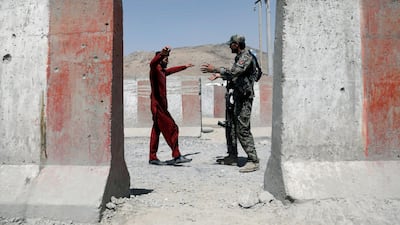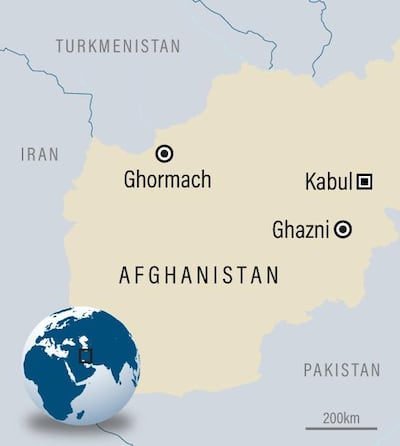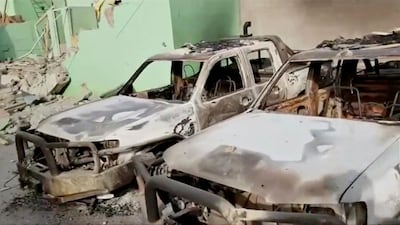Two Taliban offensives in recent days have exposed the failures of the Afghan government to counter an ongoing and bloody insurgency, four years after Nato ground troops ended combat operations, and have handed the militant group a strong position in ongoing peace talks.
Taliban fighters overran an army base in the northern Afghan province of Faryab, officials said on Tuesday, killing at least 17 soldiers. Dozens are also feared captured in a significant blow to security forces already struggling to push insurgents from the eastern city of Ghazni.
Rahimullah Yusufzai, a Taliban and regional expert, said the militants had no desire to hold the strategically important city of Ghazni, less than 150 kilometres from Kabul, and simply wanted to show it was possible.
"The strategy is to launch big attacks, to show their power, hold the city or town for some days, get their prisoners released, capture some weapons, get some money, create fear – and then leave," he said.
Nato has dismissed the Taliban assault as an "eye-catching, but inconsequential headline", yet the demoralised Afghan security forces have struggled to overpower the insurgents despite backing from United States air power.
But with the mounting civilians and military casualties, the Ghazni siege has proved arduous for the Afghan forces who are already dealing with a steadily increasing war on numerous fronts after Nato combat troops pulled out of the country in 2014.
Militants gained control of the base in Faryab – known as Camp Chinaya – after days of heavy fighting, according to the army spokesman for northern Afghanistan, Mohammad Hanif Rezaee.
Tahir Rehmani, head of Faryab's provincial council, said the military base fell after the soldiers begged for reinforcements and air support from Kabul but were ultimately ignored.
He said about 100 soldiers were on the base when it was attacked on Sunday.
"It is a tragedy that the base fell to the enemy. Some soldiers were killed, some captured and some fled to nearby hills," Mr Rezaee said.
At least 17 were killed in the attack, according to defence ministry spokesman Ghafoor Ahmad Jawed, while a local MP said Taliban fighters captured another 40 in the base.
"Preparations are under way to launch an operation to recapture the base," said the ministry's spokesman.
The fall of the base in the Ghormach district of the volatile province happened as security forces were already stretched after days of fighting in Ghazni, a strategic provincial capital two hours from Kabul.
"They were too busy with Ghazni," said Mr Rehmani.
Even as Afghan forces conduct clearance operations across Ghazni province south of Kabul, the five-day siege of the provincial capital has become a cautionary tale in the war against the Taliban.
The government says more than 100 Afghan security forces and at least 20 civilians – the UN has reports that sugesst the latter number at more than 100 – have been killed and a similar number wounded. Ghazni city is now being called a ghost town.
More than 150 Taliban fighters have also been killed but the numbers on both sides are expected to rise, acting Defence Minister Lt Gen Tariq Shah Bahrami said.
The Taliban offensive intensified over the weekend, leaving many locals trapped and stranded in their homes.
"The attack started around 3am on Friday morning. It isn't unusual to hear gunfire in Ghazni, but by 8am we were hearing heavy weapons and rockets," said Javid, who asked not to give his real name. "We also saw the Taliban enter our district and there was smoke rising from the city centre and main bazaar," he told The National by phone.
Watching the Taliban move into the city of around 150,000 people, Javid said he feared the worst and rushed to the market to stockpile supplies. “I got back to the house, made sure that we were locked in safely and took shelter in our basement," he said.
In a statement, the UN Office for the Co-ordination of Humanitarian Affairs (OCHA) said fighters had taken up positions in homes and marketplaces, heightening the risk of civilian casualties when the military brought in air power.
“The placement of improvised explosive devices (IEDs) along Highway 1 both north and south of the city has prevented civilians from safely fleeing the violence," the UN report said.
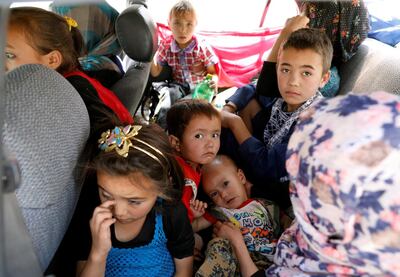
Although soldiers and police are again patrolling his area, Javid shared his account of the five days of battle. “The Taliban set fire to the local police district building and then they visited the local mosque. They told us, ‘We do not mean to harm you as long as you do as your told.’"
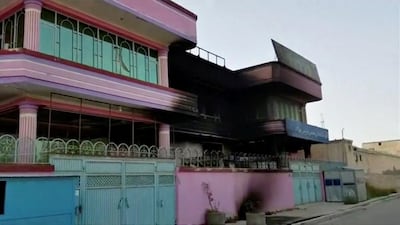
They then offered to provide locals with weapons to fight "thieves and thugs" who might try to take advantage of the situation.
The siege cut off access to basic supplies across the province. Communications networks and the electricity supply are still down across much of Ghazni. Without power to run pumps, there are water shortages in many areas. Javid said that the Taliban also destroyed the local water pump that services his densely populated neighbourhood.
OCHA said many civilians, even in the provincial capital, were unable to seek medical attention and as fighting subsides, the numbers requiring emergency care are likely to rise.
"Ghazni main hospital is reportedly overwhelmed by the high number of casualties arriving. Off-duty health staff in accessible areas of the city have been transferred to the hospital in ambulances to support their on-duty colleagues," the report said, adding that only eight surgeons were working in the operating theatre.
There are reports that Taliban fighters are still going house to house in some areas of the city, looking for government officials or their relatives to kill.
“I saw two trucks full of coffins going toward a cemetery in the city. They all seemed to be civilians," said Abdullah, who asked to only use one name.
Medical supplies are starting to run low, as is fuel to power back-up generators that run the hospital. The onslaught has been so deadly, the report said, that the hospital was running out of body bags until an emergency delivery arrived on Monday.
Although President Ashraf Ghani held emergency meetings with various security agencies and announced a surge of 1,000 Afghan army soldiers to Ghazni, through much of the fighting he has remained on the campaign trail for October's district and parliamentary elections.
______________
Afghanistan's long war:
10 of my colleagues were killed today: Afghanistan reporter recounts Kabul bombing
Afghan troops split on Taliban peace talks amid spring offensive carnage
Pakistan Taliban's new leader faces challenge to keep militants together
______________
The latest fighting also comes as efforts to negotiate a peace deal are ramping up. Last month US officials reportedly met with Taliban political members and the group visited Uzbekistan for four days of talks.
It remains to be seen how the Ghazni offensive will affect peace talks but analysts have suggested that the onslaught could be an attempt by the Taliban to negotiate from a position of strength.
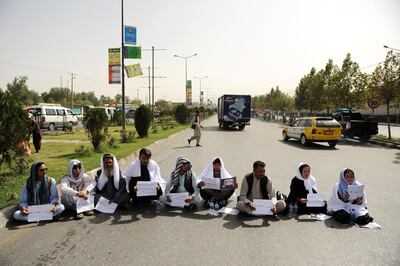
For local residents like Javid, who works as a taxi driver across the province, the signs of a looming tragedy like the offensive have been visible for months.
“For nearly a year, we [taxi drivers] have been forced to pay taxes to the Taliban”, he said. “They know each and every one of us and would cut our heads off if we refused to pay. The government has been aware of this and didn’t do anything”, he said, accusing the government of failing to protect the locals in Ghazni.
“In the last six months, the Taliban had been tightening their circle, getting closer [to the Ghazni city] village by village, district by district”, he said, adding that in the week before the siege, the Taliban attacked and destroyed outposts on roads outside the city that connect the provincial capital to the villages across the district.
“Everyone knew that”, he said. “But no action was taken and here we are today cleaning our streets, buildings and shops that were destroyed, and searching hospitals for relatives who went missing during the attacks".
